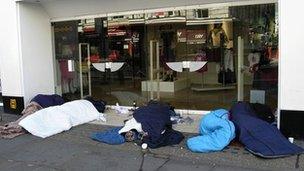Homeless people die 30 years younger, study suggests
- Published

The study said the average life expectancy of a homeless person is 47-years-old
Homeless people in England die 30 years younger than the national average, research has suggested.
The report for the charity Crisis found an average homeless person has a life expectancy of 47, compared with 77 for the rest of the population.
Drug and alcohol abuse account for a third of all deaths among the homeless.
The report comes as the government is set to announce that £20m will be spent to provide assistance to single people facing homelessness.
The Sheffield University report said that while drug and alcohol abuse often lead to homelessness, being without a home exacerbates the problem.
And while the overall average of death for men and women who were homeless was 47, the mean age of death for women was found to be even lower, at 43.
It was not just people sleeping on the streets who were studied, the wider homeless population which include those who live in night shelters, hostels and who use day centres were also considered.
General population
Researchers found that homeless people are nine times more likely to commit suicide than the rest of the population and deaths as a result of traffic accidents are three times more common.
Crisis' chief executive, Leslie Morphy, said that significant investment in the NHS had not helped homeless people to address their health issues.
"It is shocking, but not surprising, that homeless people are dying much younger than the general population," she said.
"Life on the streets is harsh and the stress of being homeless is clearly taking its toll."
A Department of Health spokesman said: "We know that many homeless people have acute and often multiple health needs.
"That is why we have established the Inclusion Health programme, which focuses on improving access to healthcare, and the results it achieves, for vulnerable groups such as rough sleepers."
The charity Shelter has also highlighted the plight of the 70,000 children they say will spend Christmas in temporary accommodation without a permanent home.
Shelter said the problem has not been fully addressed.
It pointed to the latest government figures which showed 69,846 children in England have to live in hostels, bed and breakfasts and refuges. That figure compares to more than 112,000 in 2007.
The charity's director of communications, policy and campaigns, Kay Boycott, said: "We cannot underestimate the damage homelessness has on children's lives.
"They often miss out on vital schooling because they are shunted from place to place and many become ill by the poor conditions they are forced to live in."
Council co-ordination
Housing Minister Grant Shapps responded by saying that the government would try to help anyone in need.
"The plight of homeless people should be on our minds all year round - not just at Christmas," he said.
"We're fortunate to have some of the toughest laws in the world to prevent people from ending up on our streets, and while homelessness remains lower than in 28 of the last 30 years I'm always anxious to do more.
"That's why I'm announcing £20m of new funding which, for the first time, will specifically help single homeless people, who all too often slip through the safety net. This money will be used to help prevent homelessness at an earlier stage."
Mr Shapps also said he will be asking councils to work together to decide how best to use the cash to meet local needs.
The £20m funding is in addition to the existing £400m Preventing Homelessness grant over the next four years and will be made available in the new year.
- Published20 December 2011
- Published20 December 2011